Man on a Mission: USU Graduate Greg Carr Has Spent the Past 20 Years Leading Restoration Efforts in Mozambique’s Gorongosa National Park
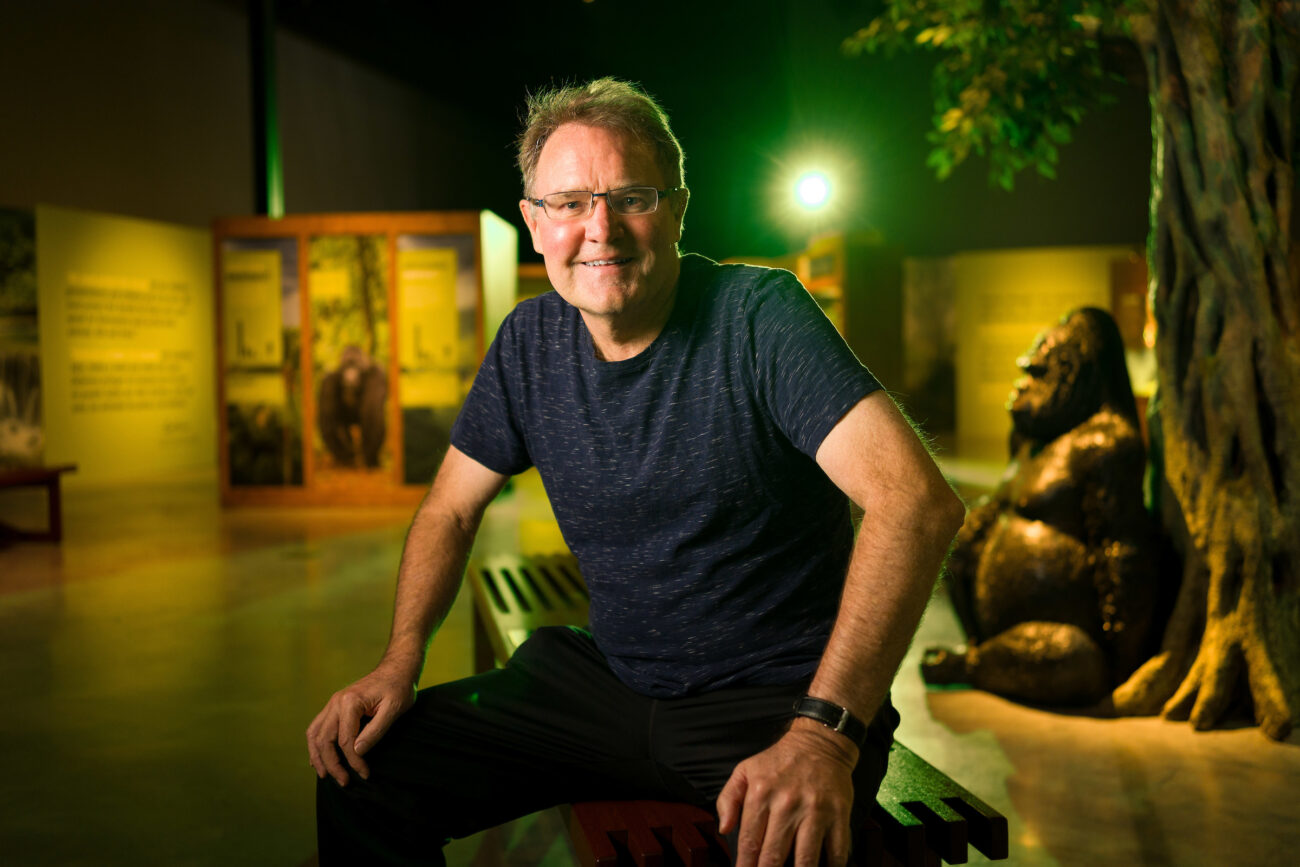
By Andrea DeHaan
While most national and international feature stories about Greg Carr focus on his connections with Harvard and Boston as well as his extensive philanthropic efforts in the African nation of Mozambique, the Utah State University graduate still spends much of his time in his quiet hometown of Idaho Falls, Idaho.
Carr’s office, which is housed in a renovated two-story house just east of downtown, sits a block away from the church where he attended preschool and is even closer to the former Carnegie Library he visited as a child that he helped transform into the Museum of Idaho in the early 2000s. Sitting on a couch dressed casually in a navy T-shirt and black joggers on this blustery autumn day, it’s clear the extremely wealthy 64-year-old is not concerned with putting on airs and feels entirely at home in the Gem State.
And yet, Carr (’82) admits that his “center of gravity is over there” in Mozambique, a place he spends upwards of eight months a year and has invested more than $100 million of his own money in an ambitious restoration project.
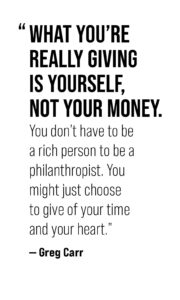
In 1986, Carr co-founded Boston Technology, a startup that sold voicemail capabilities to AT&T. Next, he chaired internet service provider Prodigy. But in 1998, Carr cut ties with his for-profit responsibilities and decided to focus on philanthropy. A year later, he established the Carr Center for Human Rights at Harvard.
Since then, Carr has been a generous supporter of humanitarian and educational causes both nationally and internationally. Today the Gregory C. Carr Foundation is most notable for its 30-year commitment to restoring Gorongosa National Park (GNP) in Mozambique.
The youngest of seven children, Carr grew up in a household that “loved reading and learning,” and where dinner discussions were spirited and encouraged.
“When it was time for me to go to college, I had two brothers at Utah State. So, I just went there,” Carr says, “I didn’t even think about it.”
Arriving in Logan in 1978, he overlapped with siblings Ken (Jon M. Huntsman School of Business ’79) and Steve (College of Humanities and Social Sciences ’81), but decided to forge his own path, taking classes in anything he liked. Beyond the chance to explore the subjects that interested him most, Carr also enjoyed having professors who were accessible and available to talk with curious students like him.
“That’s not true in every university,” Carr says. “You know, they’re locked away somewhere and you’re lucky to talk to a TA or something.”
So, he dabbled in everything: music, ecology, literature, physiology, accounting, and history. While he says he went to the occasional football game, he was mostly just “lost” in his studies.
At the same time, Carr was striking out on his own in other ways. Determined to pay his way through school, he lived for free in the basement of a house on the corner of 400 North and 400 East. According to Carr, the homeowner, Mabel, was 96 and needed someone to live there and help out from time to time. Then he found a job at a hotel down the street, working the overnight shift from 11 p.m. to 7 a.m. when Carr says there wasn’t much happening. This meant he could “do all [his] homework and get paid $2.35 an hour.”
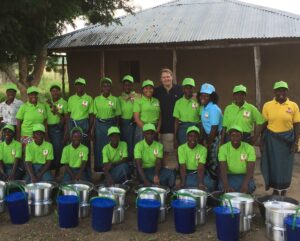
A scholarship, a rent-free living arrangement, and a low-stakes job meant Carr could put himself through college. He was living “a simple, happy life” while searching for greater meaning.
“I’m still searching,” he says.
Acknowledging that he was lucky to spend four years immersing himself in learning and little else — a privilege he knows not everyone has — Carr ultimately majored in history. He still remembers the courses he took with professors like Norm Jones, Ross Peterson, and the late Ed Glatfelter.
“As someone studying history, I was intrigued with the trickle of ideas floating through time — ideas of values. And if I had it to do over again, I would still do history,” he says. “I would say to everybody, study history, then add something on top.”
This is exactly what Carr did. After spending months in the old Merrill Library taking practice GRE tests, Carr was accepted to Harvard’s Master’s in Public Policy program. This new venture would take him to Boston — and change the course of his life in unimaginable ways — but it would take a boy from Idaho some time to warm up to the East Coast.
Of the transition, Carr says it wasn’t an intellectual one. He felt well prepared to go from USU to Harvard, but he calls the move from Logan to Cambridge, from the Intermountain West to Massachusetts, a big one.
“I was there. I liked it. I had friends, and I lived there 20 years,” Carr remembers. “But I think every second of the way, I felt like I was a Westerner. The Rocky Mountains are my home.”
He may be a Westerner at heart, but for the last two decades, Carr has found a home in Africa, where he is helping to pioneer a new approach to conservation while leveraging the best possible outcomes for the people of Mozambique. When he first traveled there in 2004, the Human Development Index ranked it among the poorest nations in the world.
“So, I’m thinking, okay, money spent here, it’s probably going to have more leverage than money spent somewhere else,” Carr says. “But not just money. I’m bringing me, I’m going to bring friends, and we’re going to get energized. We’re going to bring hope.”

He had met then-president of Mozambique, Joaquim Chissano, during an event at the Carr Center for Human Rights. Knowing Carr was a philanthropist, President Chissano reportedly said to him, “Come to Mozambique. We’re welcoming friends at this point.”
Following its independence from colonial rule, Mozambique was plagued by 15 years of civil war from 1977 to ’92. Located in Southeast Africa and bordered by the Indian Ocean, Mozambique is a country of 30 million people, renowned for its thriving fishing industry and abundant natural resources. It has sustained trading ties with Portugal, its former colonial ruler, and, by extension, other European markets. The country’s GDP has been growing since the turn of the century, and when Carr arrived in 2004, there were already efforts in place to restore the national park, which had seen its wildlife population reduced to almost nothing during the war due to fighting, unrestricted hunting, and total abandonment.
People cautioned Carr against visiting Gorongosa, which was said to be full of “land mines and mosquitos.” The devastation to the park was so severe — Carr likened it to Yellowstone National Park but with all of its wildlife gone and every building and road destroyed. He ignored the naysayers and went anyway.
“The rivers were running, the trees were growing, and the grass was there,” he says. “And I thought, if the fundamentals of the biodiversity are there, you can bring it back.”

When Carr signed a contract with the government of Mozambique, he entered an agreement with four ministries. The Ministry of Land and Environment was eager to help rebuild the park, but there was also a commitment to the ministries of agriculture, education, and health care, which Carr sees as integral to repairing the park’s ecosystem. Ecosystems, after all, are complex, interconnected systems that extend far beyond the boundary lines of a designated area. The greater ecosystem is made up of rivers, trees, grass, and animals, but it also includes the people living nearby and working in the park.
Carr’s foundation runs mobile health care clinics, connects local agriculture to resources from around the world, and is directly involved in several educational initiatives. In more than 100 primary schools, they are helping to train teachers and create after-school clubs. Recently, they’ve started preschool programs, which include meals for the children.
“This is an important part of the philosophy of philanthropy. We don’t show up and make a meal for the kids. The mothers show up and they make a meal for their kids,” says Carr, whose foundation subsidizes school nutrition with additional items. “The point is, it’s community involvement. We’re doing this together. Okay, we’re helping, but it’s your preschool.”
Improved agricultural resources, better schools, trained teachers, access to health care, and extracurricular enrichment — they all feed into an existing ecosystem, and the people within it are working collectively to keep that system intact. Carr remains committed to getting the most bang for his buck, but it has never been about maximizing his profile. His commitment to the success of the park and the people of Mozambique is palpable. He knows this is something he cannot do alone.
In 2017, Gorongosa established the only two-year graduate program run entirely inside a national park. They did this with a grant from the Howard Hughes Medical Institute. Now, the Master’s in Conservation Biology program trains Mozambicans to be leaders and scientists in the field of conservation, which Carr calls another opportunity for leveraging knowledge and catalyzing future possibilities.
It’s just another example of using one’s resources to create maximum impact. Drawing on the skills he learned while soliciting investors for Boston Technology, Carr has established partnerships with nonprofits and government organizations in the service of Gorongosa. Next year, Carr projects his foundation will contribute 20% of the budget, with other agencies, governments, and investors supplying the remaining 80%.

Even when Carr travels between Africa and the United States, he schedules stops along the way to sit down with potential collaborators. At the time of this interview, he was preparing to meet with the International Maize and Wheat Improvement Center to discuss better yields for Mozambican farmers.
“You can bring animals back to a fertile ecosystem with grass and water and trees. And then you can build ecotourism jobs,” Carr says about GNP, which is the largest employer in the area and provides a diverse range of jobs occupied almost entirely by Mozambicans.
“National parks are … a knowledge business. It takes a lot of brains. You need foresters, right? You need scientists. You need veterinarians. You need people who are experts in everything, from the soil to the top of the trees, from an ant to an elephant,” says Carr.
Instead of seeing this as a one-man task, Carr says the most effective path of philanthropy is using his resources to attract additional resources — bringing donations to bear fruit in a variety of areas.
At USU, Carr took a course from the late Doug Alder, a professor of European history. At the time, Alder was involved with the University Honors Program; a program his wife continues to support through the Douglas and Elaine Alder Endowment. Carr considers Alder a mentor, one who had a profound impact on his life, and, as it turns out, many lives.
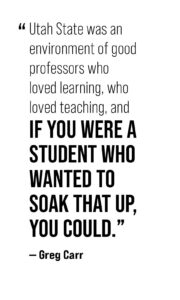
“Forty-one years ago, when I was a senior,” Carr says, “Doug Alder, looked me in the eye and said, ‘Greg, give your second million away.’”
And while Carr admits he had no idea how he was even going to make the first million, it was a moment that stayed with him and stays with him to this day. It may be cliché, he says, but when Carr started Boston Technology with his friend, he said to himself, “I’m going to make money so that I can give it away, because if I had the money, then I would have the freedom to do the things I want to do.”
Fortunate to have been in a position to use his financial success in the service of others, Carr sees opportunities to serve the people and the institutions around us in multiple ways. Whether it’s working in education, in nature, in jobs that directly serve others or simply giving of yourself to help an individual, serving humanity comes in many forms.
The work that Carr started nearly two decades ago is having an impact. Conservation efforts at Gorongosa are now a model for others, and the word is getting out. GNP has been the subject of numerous films made by the likes of Disney, PBS, and National Geographic. Carr has also appeared twice on “60 Minutes.”
Sitting in Idaho Falls, he can see that the successful constellation of a place is built from many parts. Since 2004, Carr has been helping Gorongosa put the necessary pieces back in place. Now 20 years on, Carr acknowledges a paradigm shift starting to take shape, but says that there is still a lot more to do.
“My mom went golfing when she was 100. I’m 64,” he says. “If I can stay healthy, I will do this for 20 more years.”
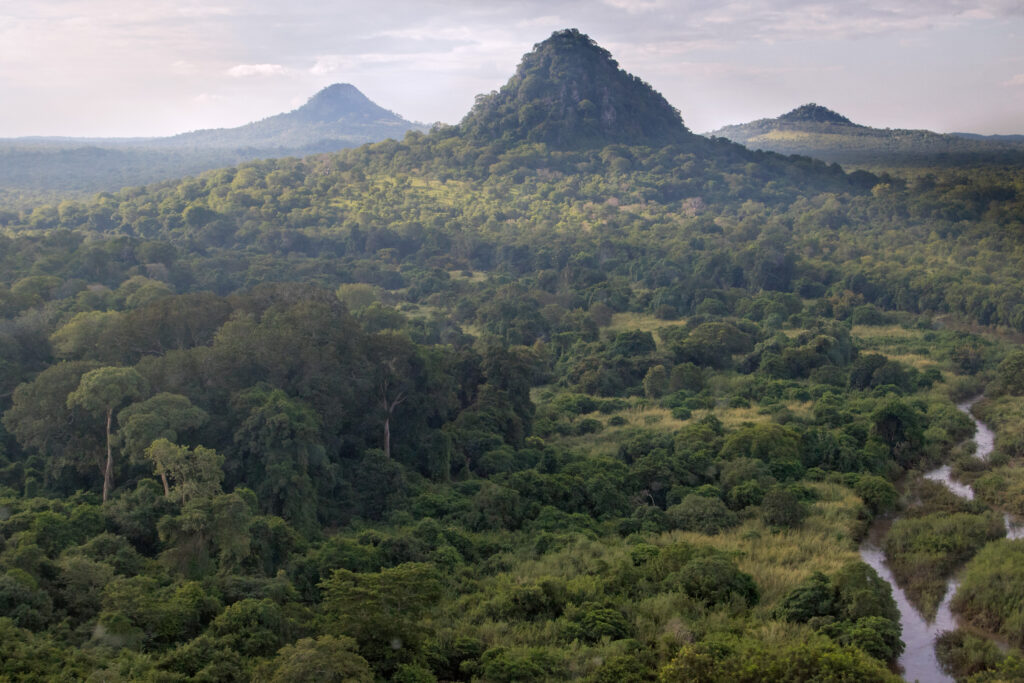




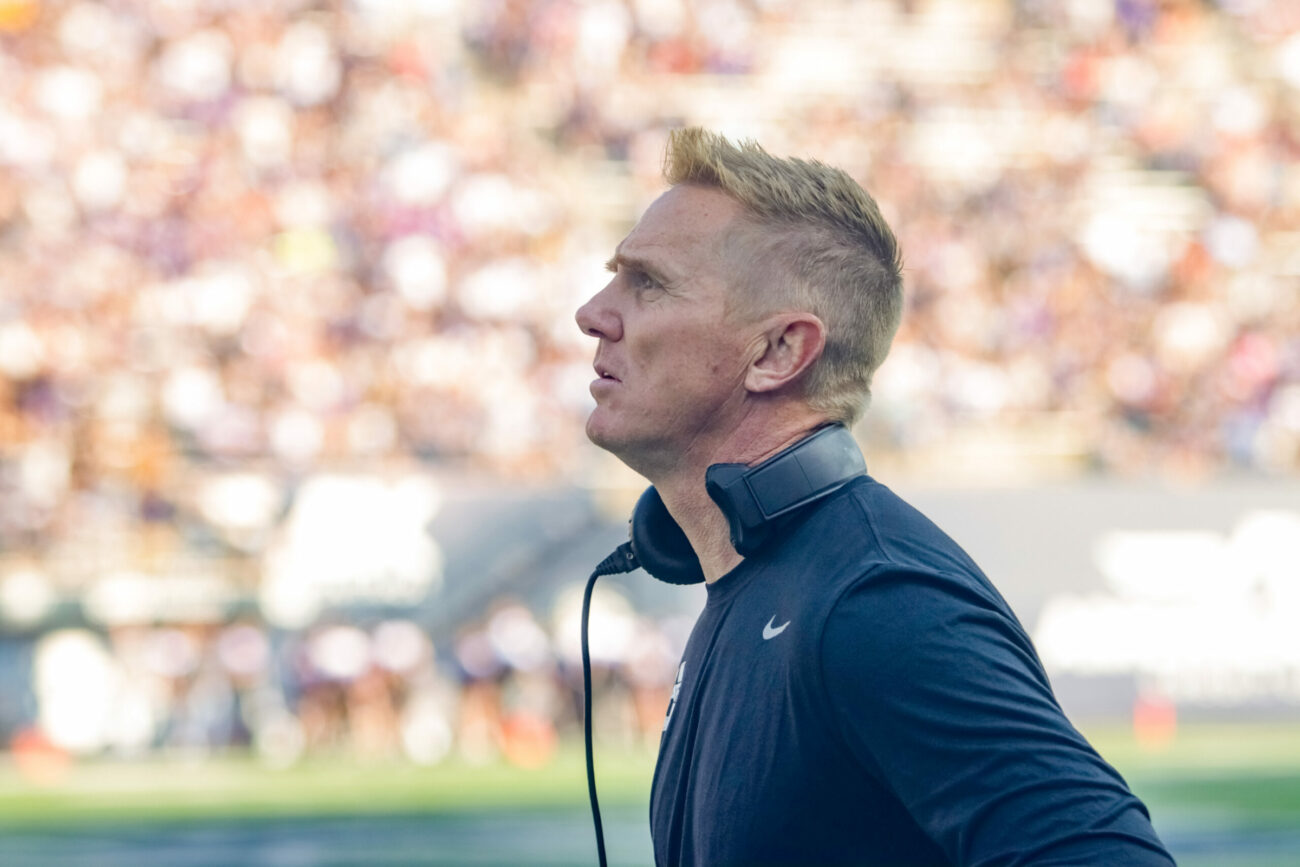
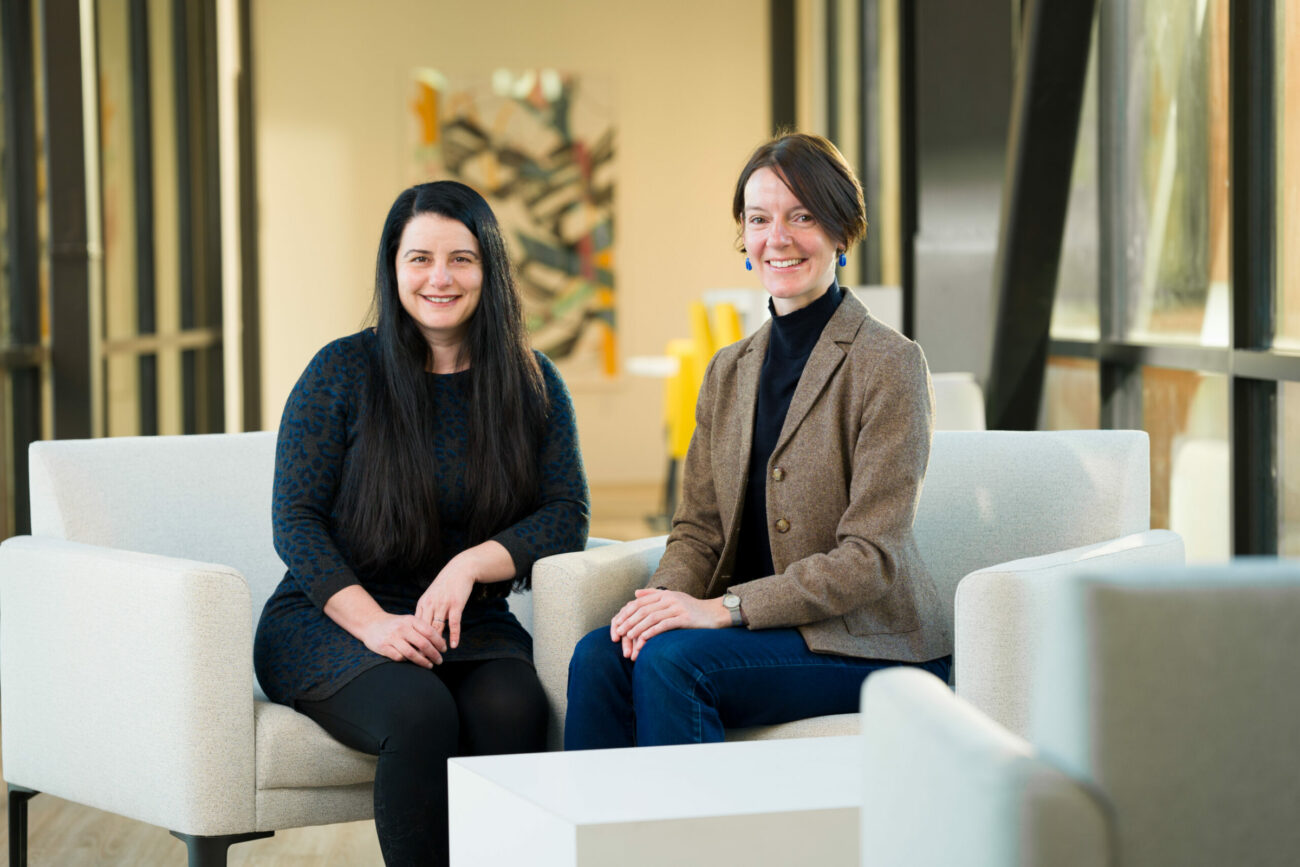
Urranne Time June 3, 2024
Mr. Carr what an inspiration you are to society. You are a man of great wisdom, kindness, goodness, and love of mankind. You are a true example of what God expect from human. You showed love not in words but in actions and deeds. I see your humility and I thank God for you. May the Lord keep you healthy and enrich your life tremendously.
Susie April 22, 2024
What an amazing human being!
Barbara Balvanz March 12, 2024
Greg: I understand this was a rerun on 60 minutes…I am convinced I need to consider more reruns!
What a humanitarian! Few can get to age 64 and accomplish the good work you have. Just reading your story has enhanced my life and hopefully made me want to be a better person at age 85.
Michael Hand, Ph.D., MSCP March 11, 2024
Please pass along to Mr.Carr my boundless admiration for all he has and is doing in his work in Africa. An amazing man and an inspiration.
M Silvi March 11, 2024
After watching 60 Minutes this evening and learning of Greg Carr’s wise and generous example of how we need to be aware of making our world a better place for people and animals.. And how education plays the must important roll in every step taken.. Thank you !
Janis Small Omide March 11, 2024
Greg Carr – something in the spirit of us who were born 1959. What a wonderful time to grow up—experiencing a Civil Rights Movement, love songs everywhere and seemingly respect for family, children and elders. Work ethic was instilled—and had I not been a product of affirmative action, I doubt that I would be “celebrating” the character and altruistic-nature of Mr. Carr. Thank Our Creator that such examples of humanitarianism still exist—especially in times when my fellow Americans are bombarded by the media reporting on so much expressions of hatred and evil-spiritedness. Salute to Mr. Carr and may his spirit become contagious.
Kathy Luban March 11, 2024
I just finished watching 60 Minutes that highlighted your efforts in Gorongosa and I was amazed and inspired. Few people, when near life’s end can look back and honestly say that they did their best for the good of mankind and the planet, but you can.
I envy your life, your ability to see a wonderful future for the people and the beasts that you are transforming.
I am going to save my pennies to some day visit your African paradise.
God bless you.
Sincerely,
Kathy Luban
Justen January 16, 2024
💚💚💚
Cassidy Stevenson December 15, 2023
This was an amazing article! I can only hope to make an impact in the world as Carr has!! I accidentally gave it 3 ⭐️ but I meant to give it 5 ⭐️’s! This was so motivational and now I’m so interested in following his work!! Good luck to you!! You are the type of people I would love to place myself and my life around!!!